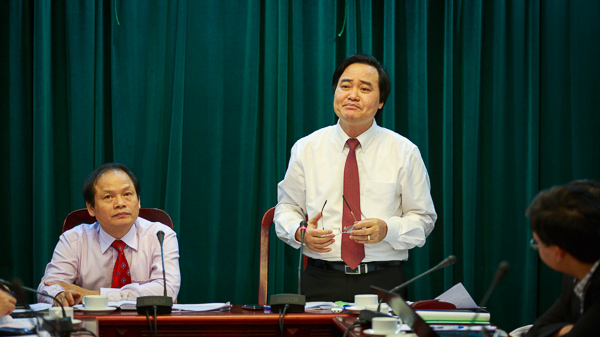On March 14, 2013, the University of Social Sciences and Humanities held a working session with the leaders of Vietnam National University, Hanoi (VNU) to discuss the University's operational situation and future development directions. The meeting was chaired by Assoc. Prof. Dr. Phung Xuan Nha (Alternate Member of the Central Committee of the Communist Party of Vietnam, Director of VNU) and Prof. Dr. Nguyen Van Khanh (Rector of the University of Social Sciences and Humanities).Professor Nguyen Van Khanh presented the achievements of the 2011-2012 academic year, the development plan from 2011-2015, and the University's development strategy until 2020 with a vision to 2030. The Rector emphasized that the University of Social Sciences and Humanities has a long-standing tradition and a high level of academic achievement, a tradition that has been continuously maintained and developed. As a member of the Vietnam National University, Hanoi, a multidisciplinary university with high autonomy, the University has many strengths and favorable conditions for cooperation and linkages in interdisciplinary training and research. The University's staff consists of highly qualified educators and scientists capable of undertaking and completing assigned training and scientific research tasks. The University has a wide network of international partners with many universities, including large and powerful universities around the world. The university has set several targets in its development plan for the coming years, including: establishing the Faculty of Anthropology and the Institute of Policy Research in 2015; researching the establishment of the Faculty of Public Administration and the Faculty of Culture and Arts; and developing 8 majors/specializations of international standard by 2020. It is projected that by 2020, the training scale will include 28 undergraduate majors and 62 postgraduate specializations; proposing and implementing 10 state-level research projects with high interdisciplinary relevance; and establishing 4 strong research groups. Each year, the university will publish 3-5 textbooks, including 1 textbook in English. By 2020, the total number of staff will be 610, including 440 lecturers, with 95% of teaching staff holding master's degrees and 70% holding doctoral degrees. To facilitate the University's development of its capabilities and position, and to achieve its planned targets, the University of Social Sciences and Humanities proposes several specific points: Regarding operational mechanisms, the Vietnam National University, Hanoi (VNU) should grant high levels of autonomy and accountability to its member units; support the establishment of the Institute for Policy Research as a pilot model integrating training and research. Regarding training, it is proposed to allocate training quotas for three new majors: Political Science, Anthropology, and Vietnamese Studies; resolve the issue of granting official major codes for Archival Studies and Office Management, Tourism Studies, and Library and Information Science; support the development of several new training programs based on separating some specializations from Oriental Studies such as Chinese Studies, Japanese Studies, Korean Studies, Indian Studies, Thai Studies, etc.; and provide stronger support for the development of basic sciences such as Philosophy, Politics, Literature, History, etc. The university should promptly approve several undergraduate and postgraduate programs, including international collaborations, that have been submitted in accordance with regulations; and reconsider some inappropriate regulations related to staff training programs in specialized training, and the foreign language proficiency requirements for graduate and doctoral students. Regarding science, VNU needs strong solutions to internationalize the research products of its scientists, such as having at least one or two journals on social sciences and humanities published in English, and translating and publishing high-quality monographs or textbooks abroad to promote VNU's research products internationally. Regarding infrastructure, it is proposed that the Center for Journalism and Communication continue to be utilized and its effectiveness further enhanced to serve training activities and promote the image of the university and VNU.

At the meeting, Associate Professor Phung Xuan Nha concluded with several points, expressing strong support from Vietnam National University, Hanoi (VNU) for the development plans of the University of Social Sciences and Humanities. The VNU Director requested that the University firmly grasp its mission as a leading and pioneering institution in training high-quality human resources in the social sciences and humanities; especially focusing on investing heavily in research activities to more clearly demonstrate its research orientation in all areas of activity, with particular emphasis on its strengths in basic research. The University needs to develop a framework of research university criteria suitable to the specific characteristics of the University of Social Sciences and Humanities, and promote the establishment of strong research groups. Regarding training, VNU supports the School's proposals related to opening new training programs, including pilot training programs in the official list of training programs, and supporting the School's continued development of high-quality international joint training programs. Regarding personnel management, VNU suggests that the School's personnel planning should adhere to research and training tasks, taking into account human resource forecasts and focusing on building a highly qualified staff.

